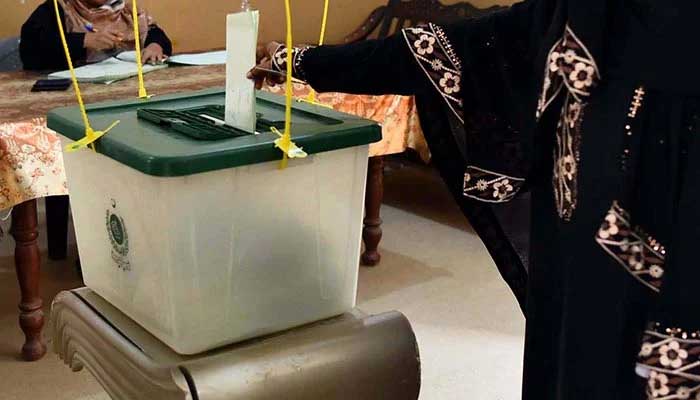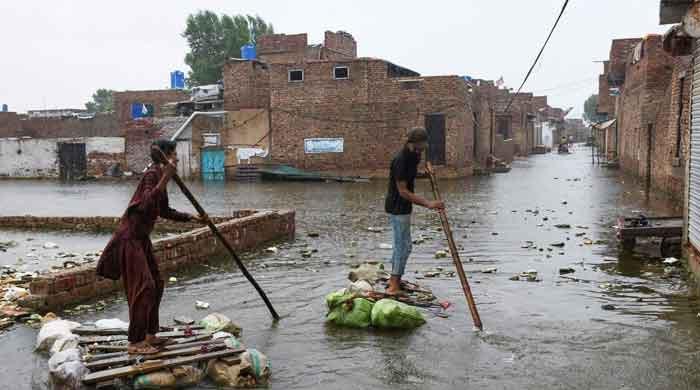'Free and fair’ elections a 'myth'
The very fact that to this day no one knows when will elections be held, though assemblies completed their tenure as per the Constitution
August 27, 2023

‘Free and fair’ elections, ‘level-playing field’ blah, blah, blah. All are ‘myths’ in Pakistan, since long and surely need to be busted into reality, if we really want to move forward as a democratic society. However, a million-dollar question is why they were not held like in any other democratic countries like Britain and India. So, will the forthcoming elections be different from the past? I ‘doubt’ it but wish the Election Commission of Pakistan (ECP) and the real power centre proved me wrong.
The very fact is that to this day no one knows when will elections be held though assemblies have completed their tenure as per the Constitution — thanks to the former ruling alliance which wanted polls in 90 days and not in 60 to gain time for election campaigns.
But the PDM government just before dissolving the assemblies called the meeting of the Council of Common Interest (CCI) on the demand of MQM Pakistan and declared the results of the 2023 census after which ECP was left with no other option but to go for delimitation of constituencies unless Supreme Court directed them to hold polls first. So if ECP goes for delimitations of constituencies it may take four to five months, meaning polls will be delayed for at least up to February 2024. The question is as to why the PDM government did it and the answer is simple —it is the considerable decline in the popularity graph of its key parties ie PML -N, JUI-F, and MQM Pakistan, while the PPP is confident to retain its position in Sindh.
This in itself provides ample proof of why elections in 2023 or 2024 will not be ‘free and fair’ due to pre-poll manoeuvring. How much space the major political opponent of PDM, would get i.e. PTI and its leader, ex-premier Imran Khan, will get another test for the real power centre?
'Level-playing field’ is yet another myth as there has never been a level-playing field for all political parties and it will not be any different now. What happened in 2018, when chips were down for PML-N and how former prime minister Nawaz Sharif was kept out through a controversial Panama Papers decision followed by a revolt against PML-N in Balochistan, making of Balochistan Awami Party (BAP) and later how elections were ‘stage-managed’ in Karachi and in the end the way PTI government was formed at the centre and in Punjab.
Three and half years later history repeated itself and the makers of the PTI government in 2018, after developing differences with Imran Khan, used their ‘king’s parties’ to dislodge him through a vote of no confidence.
So, the cycle is the same and will not be any different in these elections too. No wonder democracy was never allowed to take its natural course and why we are not ready to accept the popular mandate since the birth of Pakistan.
We lost political direction when for the first time in 1954 the Muslim League (PML) was completely washed out from East Pakistan and the United Front led by left-wing parties swept the polls, while PML secured only 10 out of 309 seats. Polls at that time were regarded as the first ‘free and fair’ ones. However, the ruling elite could not digest those results and soon governor’s rule was imposed United Front, the alliance of left-wing and nationalist parties that swept the elections were not only removed but their leaders were also put behind bars. It was the beginning of an unending political crisis in Pakistan. The left was completely crushed, the Communist Party of Pakistan (CPP) was banned, many newspapers and magazines were banned, and journalists and editors were jailed.
Pakistan has never gotten back on the right track since then and between 1954 to 1958 at least four prime ministers were removed — one of the reasons for this has been the dictatorial powers given to the Governor General through the Independence Act, which was supposed to be replaced after elections but it was extended for one year from March, 1948, but to March, 1949.
The main statesmen, whose actions undermined Pakistan’s political system, were Ghulam Mohammad, Iskandar Mirza, and Ayub Khan while leaders like Khwaja Nazim Uddin or Hussain Shaheed Suhrawardi were too weak. They emerged as the key players after the death of Jinnah and later the assassination of the first prime minister, Liaquat Ali Khan.
Former Governor General and President Iskandar Mirza instead of holding elections under the 1956 Constitution imposed Martial Law and prior to that, he brought Ayub Khan, a sitting army chief as Defence Minister and later also imposed Martial Law. Ayub took advantage of political turmoil and usurped power in October 1958.
Ayub ruled the country for 10 years under the ‘Law of Necessity’ but after four years he introduced his own 1962 Constitution and held Presidential Elections through his political system of ‘Basic Democracy.’ He was challenged by none other than the sister of Jinnah, Mohtarma Fatima Jinnah but he rigged the elections, too.
History repeated itself in the 1970 elections and this time even worse happened and even the majority party was not allowed to form the government. This time the victim was again another popular party from East Pakistan, Awami League (AL).
In 1977, former Prime Minister Zulfiqar Ali Bhutto announced early elections in 1977, though his government could have completed its full term as elections were due in 1978. Bhutto was a popular leader but in a bid to get a two-thirds majority his government allegedly rigged polls on nearly two dozen seats as a result the opposition launched a massive movement but it resulted in the third Martial Law in the country, the longest for 11 years.
Zia twice postponed the elections first in October 1977 and again in November 1979 as intelligence reports suggested PPP’s landslide victory. Yet another proof of pre-poll rigging and engineering. It was followed by his fraudulent referendum in 1984 followed by non-parties based elections whose purpose was to keep PPP out. The PPP's election symbol ‘sword’ was also removed.
In 1988, after Zia died in a plane crash elections were announced and were also held in November 1988 but once again we witnessed pre-poll rigging when the ISI-backed Islami Jamohri Ittehad (IJI) was formed and former ISI chief, General Hameed Gul admitted he was its architect. It was followed by another rigged election in 1990, this time by distributing money among IJI leaders. All these facts are now available in the famous Asghar Khan case.
Last but not least another military takeover on October 12, 1999, resulted in another so-called election of 2002 and another fraudulent referendum in 2002. In 2002, both populist leaders Benazir Bhutto and Nawaz Sharif were kept out of the polls and both PPP and PML-N were divided which resulted in the creation of PPP (Patriot) and PML-Q.
Cutting the long story short, election in Pakistan is a ‘myth’ as acceptability is the key, not the popularity and as long as we continue with this mindset I doubt there will ever be free and fair elections and true democracy. One could charge-sheet mainstream political parties as we do for their failure and weaknesses but we still can’t say bluntly why democracy actually derailed in Pakistan.
‘Jantey sub hein, magar sub chup hain.’
The writer is an analyst and columnist for GEO, Jang and The News. He tweets @MazharAbbasGEO.
Disclaimer: The viewpoints expressed in this piece are the writer's own and don't necessarily reflect Geo.tv's editorial policy.











